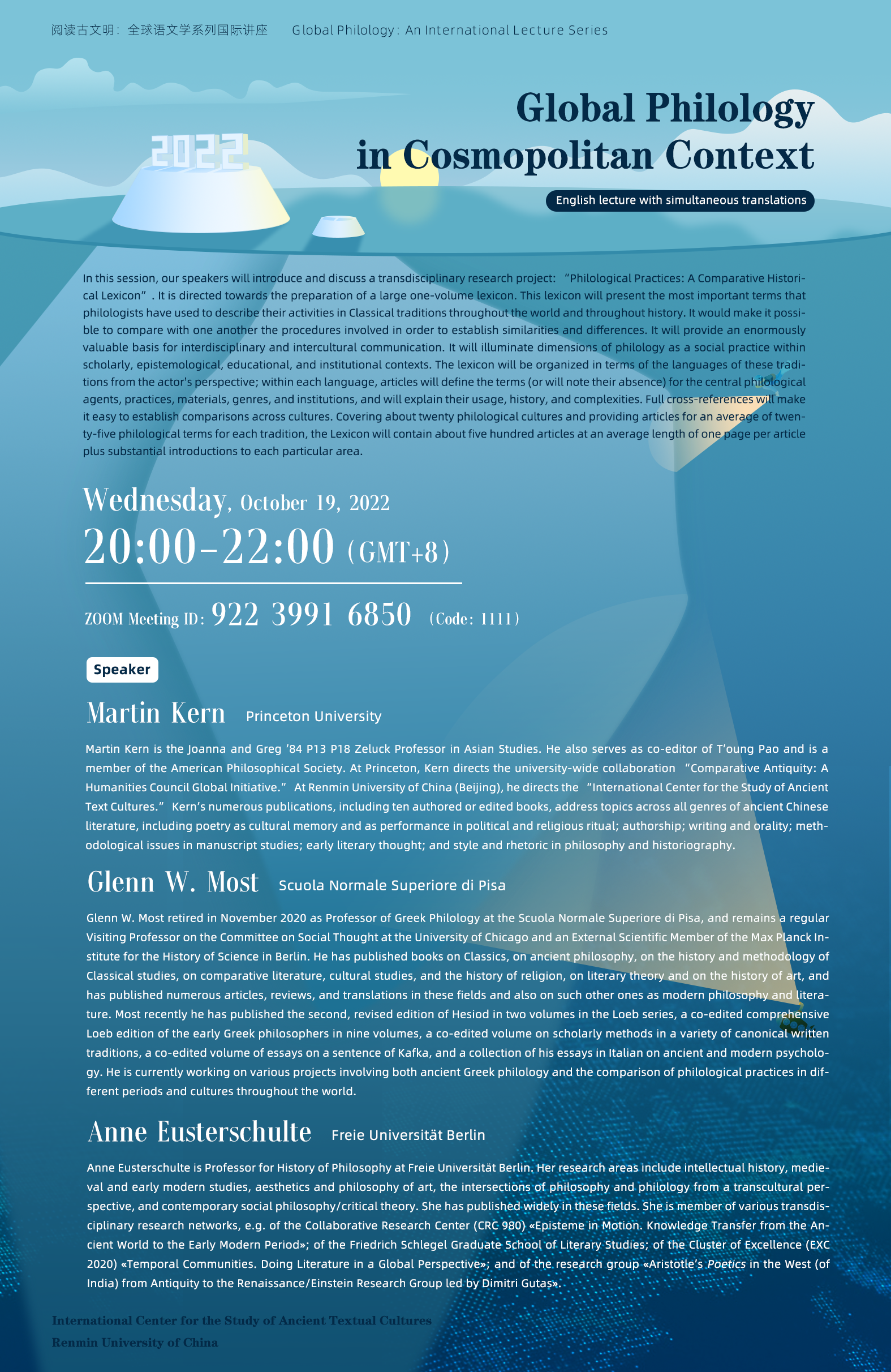[upcoming]Global Philology in Cosmopolitan Context
发布时间:2022-10-17Global Philology:An International Lecture Series
Global Philology in Cosmopolitan Context

Title: Global Philology in Cosmopolitan Context
Speakers: Martin Kern, Princeton University
Glenn W. Most, Scuola Normale Superiore di Pisa
Anne Eusterschulte,Freie Universität Berlin
Time: 20:00-22:00 (GMT+8), October 19, 2022.
Zoom Meeting ID: 922 3991 6850 (Code: 1111)
Zoom Link:https://zoom.us/j/92239916850?pwd=MnhBaGxZY1ZpQ3BGMWovRHR1U0h2QT09
About the Speakers:
Martin Kern is the Joanna and Greg ’84 P13 P18 Zeluck Professor in Asian Studies. He also serves as co-editor of T’oung Pao and is a member of the American Philosophical Society. At Princeton, Kern directs the university-wide collaboration “Comparative Antiquity: A Humanities Council Global Initiative.” At Renmin University of China (Beijing), he directs the “International Center for the Study of Ancient Text Cultures.” Kern’s numerous publications, including ten authored or edited books, address topics across all genres of ancient Chinese literature, including poetry as cultural memory and as performance in political and religious ritual; authorship; writing and orality; methodological issues in manuscript studies; early literary thought; and style and rhetoric in philosophy and historiography.
Glenn W. Most retired in November 2020 as Professor of Greek Philology at the Scuola Normale Superiore di Pisa, and remains a regular Visiting Professor on the Committee on Social Thought at the University of Chicago and an External Scientific Member of the Max Planck Institute for the History of Science in Berlin. He has published books on Classics, on ancient philosophy, on the history and methodology of Classical studies, on comparative literature, cultural studies, and the history of religion, on literary theory and on the history of art, and has published numerous articles, reviews, and translations in these fields and also on such other ones as modern philosophy and literature. Most recently he has published the second, revised edition of Hesiod in two volumes in the Loeb series, a co-edited comprehensive Loeb edition of the early Greek philosophers in nine volumes, a co-edited volume on scholarly methods in a variety of canonical written traditions, a co-edited volume of essays on a sentence of Kafka, and a collection of his essays in Italian on ancient and modern psychology. He is currently working on various projects involving both ancient Greek philology and the comparison of philological practices in different periods and cultures throughout the world.
Anne Eusterschulte is Professor for History of Philosophy at Freie Universität Berlin. Her research areas include intellectual history, medieval and early modern studies, aesthetics and philosophy of art, the intersections of philosophy and philology from a transcultural perspective, and contemporary social philosophy/critical theory. She has published widely in these fields. She is member of various transdisciplinary research networks, e.g. of the Collaborative Research Center (CRC 980) «Episteme in Motion. Knowledge Transfer from the Ancient World to the Early Modern Period»; of the Friedrich Schlegel Graduate School of Literary Studies; of the Cluster of Excellence (EXC 2020) «Temporal Communities. Doing Literature in a Global Perspective»; and of the research group «Aristotle’s Poetics in the West (of India) from Antiquity to the Renaissance/Einstein Research Group led by Dimitri Gutas».
Abstract for Conversation:
In this session, our speakers will introduce and discuss a transdisciplinary research project: “Philological Practices: A Comparative Historical Lexicon”. It is directed towards the preparation of a large one-volume lexicon. This lexicon will present the most important terms that philologists have used to describe their activities in Classical traditions throughout the world and throughout history. It would make it possible to compare with one another the procedures involved in order to establish similarities and differences. It will provide an enormously valuable basis for interdisciplinary and intercultural communication. It will illuminate dimensions of philology as a social practice within scholarly, epistemological, educational, and institutional contexts. The lexicon will be organized in terms of the languages of these traditions from the actor's perspective; within each language, articles will define the terms (or will note their absence) for the central philological agents, practices, materials, genres, and institutions, and will explain their usage, history, and complexities. Full cross-references will make it easy to establish comparisons across cultures. Covering about twenty philological cultures and providing articles for an average of twenty-five philological terms for each tradition, the Lexicon will contain about five hundred articles at an average length of one page per article plus substantial introductions to each particular area.